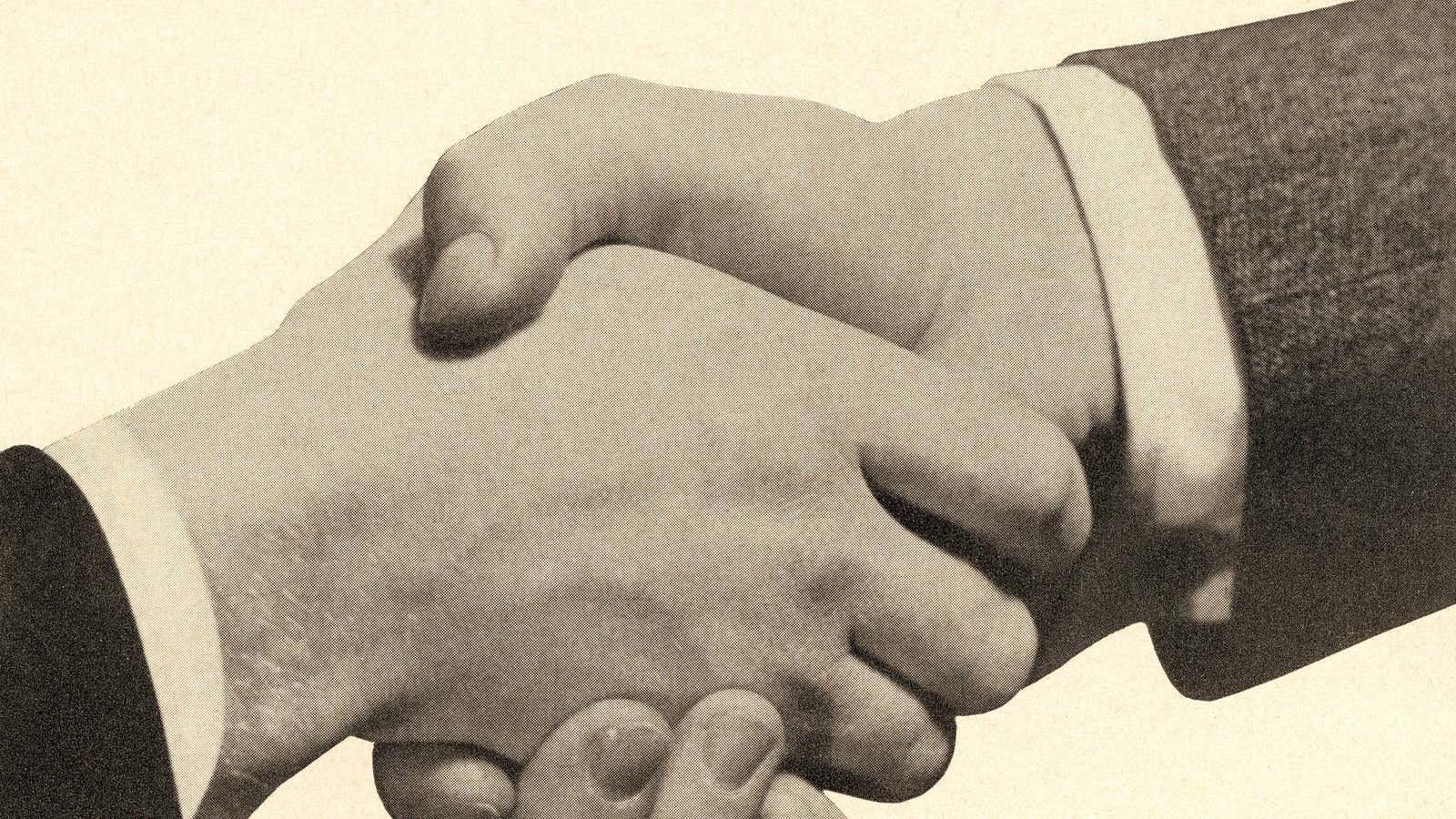Just over 10 years ago, Daniel Post Senning, author and consultant at the Emily Post Institute, noticed more clients asking him the same question: How do you decline a handshake when you don’t want to get sick?
At the time, SARS was becoming a major concern around the world. But he gave clients the same advice: Forget your fears and do it anyway, then wash your hands later.
It didn’t matter if you had seen someone cough into their palms, or sneeze and wipe their nose, before extending their hand for a customary hello. “You didn’t turn down handshakes just because you were grossed out or thought someone might be sick,” says Post Senning, a great-great-grandson of etiquette’s high priestess, Emily Post. “In a situation where you’re not talking about a global pandemic, turning down a handshake from someone is essentially saying, ‘You’re too sick to be here’ or ‘I’m too sick to be here,’” he explains.
Now, however, the coronavirus crisis has changed the revered institute’s longstanding official guidance on this topic, because rejecting a handshake carries a new subtext.
“What you’re really saying is, ‘I’m listening to public health officials and participating in a global community that’s trying to prevent this from spreading as broadly or as fast as it might otherwise,’” he argues. “You’re helping to establish a new social expectation, and that will be the new standard at least while we’re dealing with the virus.”
“The umbrella concept is that safety is more important than etiquette,” Post Senning adds, and shaking hands is an excellent way to pick up a bug like the coronavirus because of how frequently we touch our face, including our nose, mouth, and eyes, often without realizing it.
In the same way that we’ve come to ignore the awkwardness and speak up when we notice that a dinner party guest is planning to drive home after having a few drinks, he says, we now ought to feel obliged to quit the ancient handshake habit, even if it invites discomfort.
Make a decision and talk about it
That said, good etiquette can still play a role in how you comply with the new hygiene rules.
Before making the shift, Post Senning suggests first reflecting on what type of greeting you want to adopt, so that you’re not scrambling when faced with what would normally be a handshake situation. You can bow, clasp your hands in front of your chest, or put your hand over your heart as some men and women do in cultures that frown on physical touch between people of different genders, he suggests.
Once you’ve made a decision, you can let people know that you’ve changed the way you’re greeting people, explicitly acknowledging that a strong social expectation is going to be unmet, says Post Senning. “I don’t think you need a big explanation, but thinking about what you’re going to say, and how you’re going to say it, is where the etiquette sort of meets the public health expectations,” he says.
You might utter something as simple as, “I’m listening to the [health authorities] right now and not shaking hands, but it’s such a pleasure to meet you,” he says. You don’t have to be too serious or cut and dried, but you can also indicate that you’re taking the coronavirus situation seriously. There’s no need to make light of your efforts.
Next, Post Senning recommends using words to offset the loss of the social custom and “recreate a little bit of what the handshake was meant to communicate.” You might say something like, “It’s such a pleasure to meet. I’m so glad we’re here together face to face, even though people aren’t always getting together,” says the expert.
The point is to give some structure to a meeting, or a parting, which is another time when people often shake hands. “You can just say it verbally,” he says: ‘It’s been such a pleasure to be here with you.’”
Coronavirus breathes new life into old rules
The Emily Post Institute is not alone in deviating from standard handshake advice. But if etiquette experts are taking a radical new stand on handshakes, they are also standing by older rules. For instance, not touching your face has been “a point of traditional etiquette that’s been true since Emily wrote her first book in 1922,” Post Senning explains.
“There’s a funny little thing about dining etiquette that says there’s nothing good that can happen at the table with your hands above your shoulders, except bringing food to your mouth,” he adds.
Such principles, including the better-known adage about washing your hands before you come to the table, are common courtesy and good public health, and have been keeping people well for a century, Post Senning remarks. And they’re just as true whether you’re around a table sharing food, pens, papers, or handshakes.
